List of United States Supreme Court cases, volume 169
| Supreme Court of the United States | |
|---|---|
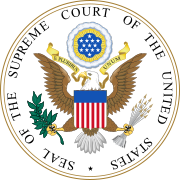 | |
| Established | March 4, 1789[1] |
| Location | Washington, D.C. |
| Coordinates | 38°53′26″N 77°00′16″W / 38.89056°N 77.00444°WCoordinates: 38°53′26″N 77°00′16″W / 38.89056°N 77.00444°W |
| Composition method | Presidential nomination with Senate confirmation |
| Authorized by | Constitution of the United States, Art. III, § 1 |
| Judge term length | life tenure, subject to impeachment and removal |
| Number of positions | 9 (by statute) |
| Website | supremecourt |
| This article is part of the series on the |
| Supreme Court of the United States |
|---|
 |
| The Court |
|
| Current membership |
|
| Lists of justices |
|
| Court functionaries |
|
|
| Constitutional law of the United States |
|---|
 |
| Overview |
|
| Principles |
|
| Government structure |
|
| Individual rights |
|
| Theory |
|
This is a list of the 47 cases reported in volume 169 of United States Reports, decided by the Supreme Court of the United States in 1898.
Justices of the Supreme Court at the time of volume 169 U.S.[]
The Supreme Court is established by Article III, Section 1 of the Constitution of the United States, which says: "The judicial Power of the United States, shall be vested in one supreme Court . . .". The size of the Court is not specified; the Constitution leaves it to Congress to set the number of justices. Under the Judiciary Act of 1789 Congress originally fixed the number of justices at six (one chief justice and five associate justices).[2] Since 1789 Congress has varied the size of the Court from six to seven, nine, ten, and back to nine justices (always including one chief justice).
When the cases in volume 169 were decided the Court comprised the following nine members:
| Portrait | Justice | Office | Home State | Succeeded | Date confirmed by the Senate (Vote) |
Tenure on Supreme Court |
|---|---|---|---|---|---|---|
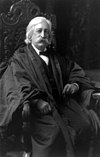
|
Melville Fuller | Chief Justice | Illinois | Morrison Waite | July 20, 1888 (41–20) |
October 8, 1888 – July 4, 1910 (Died) |
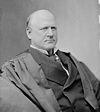
|
John Marshall Harlan | Associate Justice | Kentucky | David Davis | November 29, 1877 (Acclamation) |
December 10, 1877 – October 14, 1911 (Died) |
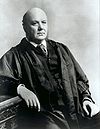
|
Horace Gray | Associate Justice | Massachusetts | Nathan Clifford | December 20, 1881 (51–5) |
January 9, 1882 – September 15, 1902 (Died) |
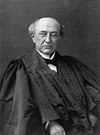
|
David Josiah Brewer | Associate Justice | Kansas | Stanley Matthews | December 18, 1889 (53–11) |
January 6, 1890 – March 28, 1910 (Died) |

|
Henry Billings Brown | Associate Justice | Michigan | Samuel Freeman Miller | December 29, 1890 (Acclamation) |
January 5, 1891 – May 28, 1906 (Retired) |
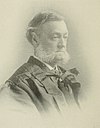
|
George Shiras Jr. | Associate Justice | Pennsylvania | Joseph P. Bradley | July 26, 1892 (Acclamation) |
October 10, 1892 – February 23, 1903 (Retired) |

|
Edward Douglass White | Associate Justice | Louisiana | Samuel Blatchford | February 19, 1894 (Acclamation) |
March 12, 1894 – December 18, 1910 (Continued as chief justice) |
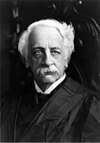
|
Rufus W. Peckham | Associate Justice | New York | Howell Edmunds Jackson | December 9, 1895 (Acclamation) |
January 6, 1896 – October 24, 1909 (Died) |
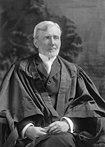
|
Joseph McKenna | Associate Justice | California | Stephen Johnson Field | January 21, 1898 (Acclamation) |
January 26, 1898 – January 5, 1925 (Retired) |
Notable Cases in 169 U.S.[]
Holden v. Hardy[]
In Holden v. Hardy, 169 U.S. 366 (1898), the Supreme Court held that a limitation on working time for miners and smelters was constitutional. The decision stated that the Utah law was a legitimate exercise of the state's police power; that such a law is legitimate if there is indeed a rational basis, supported by facts, for the legislature to believe particular work conditions are dangerous.

United States v. Wong Kim Ark[]
United States v. Wong Kim Ark, 169 U.S. 649 (1898), is a landmark decision in which the Supreme Court held that "a child born in the United States, of parents of Chinese descent, who, at the time of his birth, are subjects of the Emperor of China, but have a permanent domicil and residence in the United States, and are there carrying on business, and are not employed in any diplomatic or official capacity under the Emperor of China", is a U.S. citizen. This is due to the first clause of the Fourteenth Amendment of the Constitution, 'All persons born or naturalized in the United States, and subject to the jurisdiction thereof, are citizens of the United States and of the State wherein they reside.'" This decision established an important precedent in the interpretation of the Citizenship Clause of the Fourteenth Amendment to the Constitution.[3]
Citation style[]
Under the Judiciary Act of 1789 the federal court structure at the time comprised District Courts, which had general trial jurisdiction; Circuit Courts, which had mixed trial and appellate (from the US District Courts) jurisdiction; and the United States Supreme Court, which had appellate jurisdiction over the federal District and Circuit courts—and for certain issues over state courts. The Supreme Court also had limited original jurisdiction (i.e., in which cases could be filed directly with the Supreme Court without first having been heard by a lower federal or state court). There were one or more federal District Courts and/or Circuit Courts in each state, territory, or other geographical region.
The Judiciary Act of 1891 created the United States Courts of Appeals and reassigned the jurisdiction of most routine appeals from the district and circuit courts to these appellate courts. The Act created nine new courts that were originally known as the "United States Circuit Courts of Appeals." The new courts had jurisdiction over most appeals of lower court decisions. The Supreme Court could review either legal issues that a court of appeals certified or decisions of court of appeals by writ of certiorari.
Bluebook citation style is used for case names, citations, and jurisdictions.
- "# Cir." = United States Court of Appeals
- e.g., "3d Cir." = United States Court of Appeals for the Third Circuit
- "C.C.D." = United States Circuit Court for the District of . . .
- e.g.,"C.C.D.N.J." = United States Circuit Court for the District of New Jersey
- "D." = United States District Court for the District of . . .
- e.g.,"D. Mass." = United States District Court for the District of Massachusetts
- "E." = Eastern; "M." = Middle; "N." = Northern; "S." = Southern; "W." = Western
- e.g.,"C.C.S.D.N.Y." = United States Circuit Court for the Southern District of New York
- e.g.,"M.D. Ala." = United States District Court for the Middle District of Alabama
- "Ct. Cl." = United States Court of Claims
- "Ct. Com. Pl." = Court of Common Pleas (a state court)
- The abbreviation of a state's name alone indicates the highest appellate court in that state's judiciary at the time.
- e.g.,"Pa." = Supreme Court of Pennsylvania
- e.g.,"Me." = Supreme Judicial Court of Maine
List of cases in volume 169 U.S.[]
| Case Name | Page & year | Opinion of the Court | Concurring opinion(s) | Dissenting opinion(s) | Lower Court | Disposition of case |
|---|---|---|---|---|---|---|
| Stuart v. Hayden | 1 (1898) | Harlan | none | none | 8th Cir. | affirmed |
| United States v. Passavant | 16 (1898) | Fuller | none | Brown | 2d Cir. | remanded to divided lower court |
| Hetzel v. Baltimore & O.R.R. Co. | 26 (1898) | Harlan | none | none | D.C. Cir. | reversed |
| In re Boardman ex rel. Durrant | 39 (1898) | Fuller | none | none | 9th Cir. | habeas corpus denied |
| Building & Loan Ass'n v. Price | 45 (1898) | Peckham | none | none | C.C.N.D. Tex. | reversed |
| Williams v. Paine | 55 (1898) | Peckham | none | none | D.C. Cir. | affirmed |
| Holder v. Aultman Miller & Co. | 81 (1898) | Gray | none | none | C.C.E.D. Mich. | affirmed |
| Powers v. Chesapeake & O. Ry. Co. | 92 (1898) | Gray | none | none | C.C.D. Ky. | affirmed |
| Union Mut. Life Ins. Co. v. Kirchoff | 103 (1898) | Fuller | none | none | Ill. | dismissed |
| Wetmore v. Rymer | 115 (1898) | Shiras | none | none | C.C.E.D. Tenn. | reversed |
| Richardson v. Louisville & N.R.R. Co. | 128 (1898) | Fuller | none | none | Fla. | affirmed |
| Chicago, M. & S.P. Ry. Co. v. Solan | 133 (1898) | Gray | none | none | Iowa | affirmed |
| Ritter v. Mutual Life Ins. Co. | 139 (1898) | Harlan | none | none | 3d Cir. | affirmed |
| Benjamin v. City of New Orleans | 161 (1898) | Fuller | none | none | 5th Cir. | dismissed |
| Cessna v. United States | 165 (1898) | Brewer | none | none | Ct. Priv. Land Cl. | affirmed |
| Baker v. Cummings | 189 (1898) | White | none | none | D.C. Cir. | reversed |
| United States v. Klumpp | 209 (1898) | Fuller | none | none | 2d Cir. | reversed |
| Barrett v. United States I | 218 (1898) | Fuller | none | none | C.C.D.S.C. | affirmed |
| Barrett v. United States II | 231 (1898) | Fuller | none | none | W.D.S.C. | affirmed |
| Levis v. Kengla | 234 (1898) | Gray | none | none | D.C. Cir. | affirmed |
| Wetzel v. Minnesota Ry. Transfer Co. | 237 (1898) | Brown | none | none | 8th Cir. | affirmed |
| Dull v. Blackman | 243 (1898) | Brewer | none | none | Iowa | affirmed |
| United States v. City of Louisville | 249 (1898) | Peckham | none | none | Ct. Cl. | affirmed |
| Logan County v. United States | 255 (1898) | Peckham | none | none | Ct. Cl. | affirmed |
| Thomas v. Gay | 264 (1898) | Shiras | none | none | Sup. Ct. Terr. Okla. | reversed |
| Baker v. Grice | 284 (1898) | Peckham | none | none | C.C.N.D. Tex. | reversed |
| Willis v. Eastern Tr. & Banking Co. | 295 (1898) | Gray | none | none | D.C. Cir. | reversed |
| Richmond & A.R.R. Co. v. R.A. Patterson Tobacco Co. | 311 (1898) | White | none | none | Va. | affirmed |
| United States v. Garlinger | 316 (1898) | Shiras | none | none | Ct. Cl. | reversed |
| Payne v. Robertson | 323 (1898) | White | none | none | Sup. Ct. Terr. Okla. | affirmed |
| United States v. Eaton | 331 (1898) | White | none | none | Ct. Cl. | affirmed |
| Beley v. Naphtaly | 353 (1898) | Peckham | none | none | 9th Cir. | affirmed |
| Smith v. Naphtaly | 365 (1898) | Peckham | none | none | 9th Cir. | affirmed |
| Holden v. Hardy | 366 (1898) | Brown | none | none | Utah | affirmed |
| Smithsonian Inst. v. Meech | 398 (1898) | Brewer | none | none | D.C. Cir. | reversed |
| Brown v. Marion Nat'l Bank | 416 (1898) | Harlan | none | none | Ky. | reversed |
| Savings & Loan Soc'y v. Multnomah Cnty. | 421 (1898) | Gray | none | none | C.C.D. Or. | affirmed |
| Central Nat'l Bank v. Stevens | 432 (1898) | Shiras | none | none | N.Y. | reversed |
| Smyth v. Ames | 466 (1898) | Harlan | none | none | C.C.D. Neb. | affirmed |
| Merritt v. Bowdoin Coll. | 551 (1898) | Harlan | none | none | C.C.N.D. Cal. | dismissed |
| Backus v. Fort St. Union Depot Co. | 557 (1898) | Brewer | none | Harlan | Mich. | affirmed |
| Wilson v. North Carolina | 586 (1898) | Peckham | none | none | N.C. | dismissed for want of jurisdiction |
| United States ex rel. Bernardin v. Butterworth | 600 (1898) | Shiras | none | none | D.C. Cir. | reversed |
| McCormick Harvesting Mach. Co. v. Aultman Co. | 606 (1898) | Brown | none | none | 6th Cir. | remanded to divided lower court |
| Missouri, K. & T. Ry. Co. v. Haber | 613 (1898) | Harlan | none | Brewer | Kan. | affirmed |
| Louisville & N.R.R. Co. v. Behlmer | 644 (1898) | Fuller | none | none | 4th Cir. | vacation of supersedeas denied |
| United States v. Wong Kim Ark | 649 (1898) | Gray | none | Fuller | C.C.N.D. Cal. | affirmed |
Notes and references[]
- ^ Lawson, Gary; Seidman, Guy (2001). "When Did the Constitution Become Law?". Notre Dame Law Review. 77: 1–37.
- ^ "Supreme Court Research Guide". Georgetown Law Library. Retrieved April 7, 2021.
- ^ "Donald Trump meet Wong Kim Ark, the Chinese American Cook who is the father of 'birthright citizenship'". Washington Post. August 31, 2015.
See also[]
- Certificate of division
External links[]
- [1] Case reports in volume 169 from Library of Congress
- [2] Case reports in volume 169 from Court Listener
- [3] Case reports in volume 169 from the Caselaw Access Project of Harvard Law School
- [4] Case reports in volume 169 from Google Scholar
- [5] Case reports in volume 169 from Justia
- [6] Case reports in volume 169 from Open Jurist
- Website of the United States Supreme Court
- United States Courts website about the Supreme Court
- National Archives, Records of the Supreme Court of the United States
- American Bar Association, How Does the Supreme Court Work?
- The Supreme Court Historical Society
- Lists of United States Supreme Court cases by volume
- 1898 in United States case law
